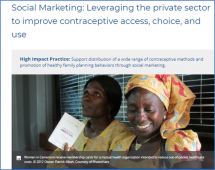Social Marketing: Leveraging the Private Sector to Improve Contraceptive Access, Choice, and Use
This page is dedicated to showing how private sector involvement improves contraceptive access and use.
Social marketing complements the public-sector family planning distribution system by utilizing the extensive network of commercial and non-governmental sector outlets, such as pharmacies, shops, community-based distributors, private health care providers/outlets, kiosks, and community health workers. Together, the public and private distribution systems provide more extensive access and population coverage than the public sector could provide alone. At least three systematic reviews of social marketing programs found that these programs have had a positive impact on clients’ knowledge of and access to contraceptive methods and on condom use.
The page includes various tools, statistics, graphs, and references.
Last modified: September 20, 2019
Language: English

